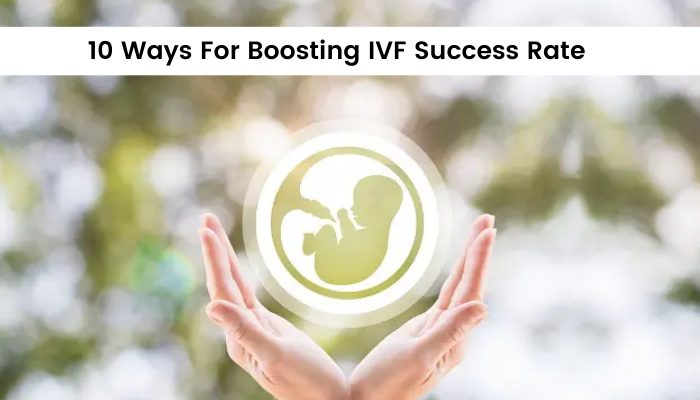Although many couples successfully conceive after a few months of hoping, some face more trouble and battle with their IVF success rate. So, there seem to be several alternatives for expectant parents regarding fertility treatments. IVF (In Vitro Fertilization) is frequently the last medical choice for couples attempting to conceive, and it’s time-consuming, costly, and demands complete dedication.
So, if you are planning for an IVF process or undergoing other Infertility treatments, you would be researching the IVF success rate in India. Moreover, note that certain factors impact the IVF success rate in the first attempt.
Check out all the vital information that will help in boosting your IVF Success rate.
How to Boost IVF Success Rate

1. Select Clinic With Good IVF Success Rate
You can select Mishka IVF center in Jaipur. We are consistently delivering good IVF success rate from many years. The success rate depends on the IVF clinic you choose for your treatment. Every step matters, from planning to procedures so choose wisely.
2. Prepare Yourself On Emotional & Physical Level For Undergoing Treatment
IVF is stressful, demanding, and demoralizing to many couples. On every level – emotionally, bodily, and mentally – bracing yourself for its challenges and establishing techniques for managing the process can help.
Moreover, talk about any pre-existing medical conditions with your infertility doctor. Feel free to express yourself, ask inquiries, and have your doubts answered.
When you better prepare yourself and are aware of the challenges and hurdles in your way, you will plan accordingly and make the entire process smooth. Stress and negativity can impact your success.
3. Choose a Highly Experienced IVF Specialist For Treatment
Your facility will tell you that an embryo transfer is regular. You are the person who is paying for the services and treatment. So, insist that your embryo transfer be performed by the team’s leading clinician or specialist. Hopefully, they’ll be the same person who has been in charge of your treatment so far.
It is vital to have prior experience. You want to get the greatest, and the experienced doctor can carry out the embryo transfer with great attention. It is also essential for your IVF success rate.
4. Make Changes In Your Lifestyle

We don’t just imply the aspects of life typically linked with a bad lifestyle, including smoking, alcohol, and not exercising.
Moreover, the term “lifestyle” refers to your entire life, particularly your relationships. Also, anxiety levels, work-life equilibrium, feelings and emotions, and fitness are all things to consider.
It’s important to realize that changing your lifestyle isn’t a huge commitment. Moreover, remember that your little efforts will bring you a lifetime of happiness. Also significantly, improve your IVF success rate.
As a couple, sort through these issues and determine how you might produce a big and positive change:
- Relationship
- Levels of energy
- Support and Care
- Work-life balance
- Stress levels
- Mentality
- Emotional well-being
- Good Nutrition
- Physical Activity
5. Look For Your Stress Relives
When you’re worried, your body enters into survival mode, which means it suspends non-essential activities like reproduction and focuses on the bodily procedures that keep you surviving. Absorption of nutrients is hindered, hormones become unbalanced, and your body is constantly on alert.
So, make efforts to minimize your tension and increase your calmness. Have a good sleep, think of the good moments, and be hopeful.
6. Ask Your Partner To Improve Their Sperm Health
Ask your partner to improve the health of their sperm. Moreover, ” Multivitamins and keeping a healthy weight, as well as wearing boxers rather than briefs, may help to boost sperm quality. Men can also consult and start consuming drugs to enhance sperm quantity and quality, which can help with IVF success Rate. Report any irregularities in semen analysis to a male infertility expert.
7. Check On Your Vitamin D Levels

Vitamin D deficiency is on the upsurge because of our more “indoor” lifestyles as the significant source of Vitamin D is sunlight; yet, Vitamin D is quickly becoming the essential vitamin for fertility.
Vitamin D is found in the follicular fluid that nurtures the growing eggs in the ovaries. Also, according to studies, women with lower vitamin D levels are more likely to have implantation problems.
8. Supplements For Improving Fertility
It’s critical to maximize the likelihood of winning by ensuring that neither the male nor the female is deficient in any vitamin, minerals, or other crucial fertility vitamins. So, supplements can help with this.
There are a variety of supplements that are both affordable and effective in supporting a healthy pregnancy. Additionally, Prenatal vitamins could be a good option.
Start a supplements program three months ahead of your IVF treatment to restore and renew your body, as well as optimize your body’s mechanisms in preparation for IVF treatments. This will help you get more folic acid, and it can increase the chances of IVF success rate.
Upon testing your Vitamin D level, if the test shows up lower levels, it’s a good idea to consume a vitamin D supplement.
Moreover, check your alternatives with your fertility specialist or doctor before introducing any supplement to your diet. Also, they can assist you in determining which are the greatest for both of you and your particular health condition.
9. Do Regular Exercise

In general, it’s best to take it lightly throughout your IVF treatment to avoid exerting excessive strain on the body, which might have harmful consequences on the IVF Success Rate. However, this does not indicate that you need to prevent all forms of exercise.
If you have a normal BMI, it is suggested that you proceed with your regular exercise program throughout IVF.
Running, in particular, is exceptionally rigorous on the body and reproductive functions. As a result, keeping this activity to a minimum throughout your IVF treatment may be preferable. Instead of jogging, walking, or cycling, dedicated runners could consider light jogging, walking, or riding.
Avoid extreme activity, such as High-Intensity Intervals (HIT), leaping activities, or strength exercises. Again, these can raise your cortisol levels, lowering your chances of success.
Try yoga if you wish to add or vary a moderate exercise to your program. A mild yoga practice that includes stretches can calm you down while keeping you active. Moreover, look for pregnant or restorative yoga courses near you or on the internet.
It’s also better to discuss your options with your doctor or fertility team about your possibilities, and they can help you figure out what’s appropriate for your case.
10. Be Patient And Optimist
Several patients need over one IVF cycle to obtain an embryo for transplant, and results might vary considerably. If your first cycle didn’t work out, your doctor is likely to tweak the medicines to make the next one better. Other times, it simply entails determination. Don’t get disheartened by poor results or setbacks; you’re doing everything correctly.
Moreover, it is essential to remember that nothing is in your control. Keep patience and have a positive outlook for a better IVF success rate.
FAQs
Q 1. What is the IVF success rate in the first attempt?
Women under 35 who successfully become pregnant through in-vitro fertilization (IVF) on the first attempt (indicating the first egg extraction) is 55%. The large majority of unsuccessful IVF sessions are due to poor embryo quality.
Q 2. Who is a good candidate for IVF?
If you’ve had trouble conceiving through natural procedures, particularly when paired with fertility medicines, you might be a suitable candidate for IVF. You might be a good candidate for IVF if you’re releasing healthy eggs that aren’t getting fertilized. Additionally, if any other reason is the cause of your infertility, fertility experts can assess your condition.
Q 3. How many tries does it take for IVF to work?
Three complete cycles of IVF improve the likelihood of a successful conception to 45-53 percent. For females under 40, three IVF rounds are the most cost-efficient and clinically appropriate number.

